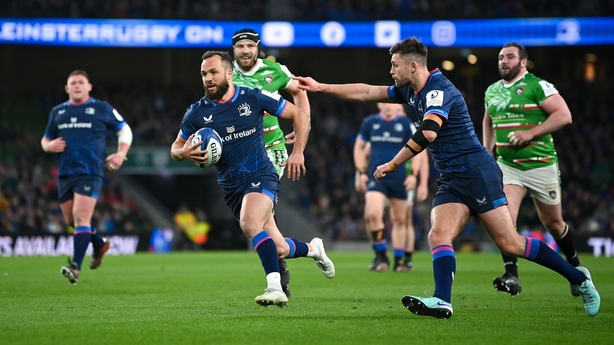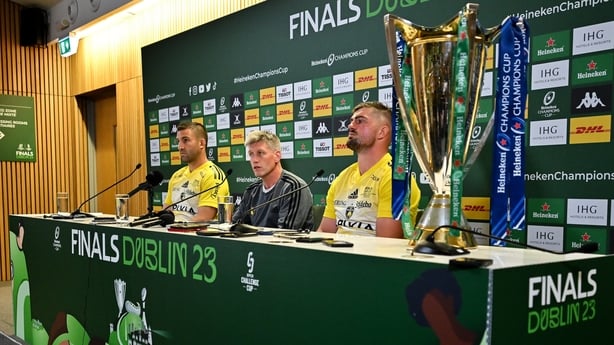The Champions Cup quarter-finalists were decided after an exciting round of knockout games played out last weekend.
While there are some thrilling match-ups with new rivalries, old foes meet in Dublin on Saturday evening.
Leinster will look to double down on their group win against La Rochelle by putting an end to the hold that Ronan O'Gara's men have on them in the knockout stages in recent years.
La Rochelle have struggled at times this season, and while their win-rate is questionable, their love of this tournament under O'Gara is undeniable.
Leicester, possibly in an English template, disrupted Leinster at times last Saturday evening. La Rochelle can certainly use some of that template to their own advantage.
Before you look too much into strategy and tactics, rugby can be a simple game. Going forward in collisions makes the game a lot easier. Making decisions with more time and space will always be easier if the defence has less time to set. Any strategy or tactic in rugby will be planned as a way of going forward.
There’s a pretty straightforward way of doing that, which is by winning collisions at the tackle line. In that case, size matters.
It’s no surprise that Leinster recruited Jason Jenkins to polish their pack, before Joe McCarthy stepped up.
They’ve doubled down on that tactic with the signing of RG Snyman, it’s clearly an area where they feel they need some supplementation.
It's an area where La Rochelle have caused them trouble in the past. The compassionate giant, Will Skelton, is a colossal focal point for O'Gara’s side, accompanied by Uini Atonio and others.
However, the game isn’t that simple. Before the ball gets to any collision, you have to start at a set-piece.
Leinster are one of the best set-piece teams, solid foundations with top quality hookers and a scrummaging pack anchored by Tadhg Furlong and Andrew Porter.
What Leinster may lack in terms of overall horsepower, they make up for with accuracy and agility. Caelan Doris, Dan Sheehan, Ryan Baird and McCarthy have the ability to carry and move like a forward-back hybrid at times, and they make it hugely difficult for any opposition.

I’ve no doubt that Leinster have a few more set-piece plays like the one that led to Jamison Gibson-Park’s (above) first try last weekend.
A second phase set-piece through the hands of Sheehan to the barnstorming McCarthy before offloading back inside to Gibson-Park. With dominance in the set-piece, you get more chances to trouble the opposition with strike plays like that.
The fact that the damage came from the second phase will tell you that there was a ruck beforehand. The speed of ruck that Leinster played with last weekend will challenge any team left in the tournament.
While Leicester did their utmost to counter the speed of ball by firing bodies into the breakdown, there were some instances where the ball was moved by Gibson-Park before they could lay a glove on him.
His interplay with Sheehan for his second try shows the importance of Gibson-Park to Leinster’s phase play.
La Rochelle need to find a way to trap the ball in the breakdown for much longer than Leicester could at times, and when they get a chance to make legal contact with Gibson-Park, they have to make sure he gets put to ground, and stays there for a second or two.
A clean set-piece will help a team to deliver the ball in the best possible way to win collisions through movement, agility and decision-making.
Winning the collisions helps to win the breakdown, which results in faster ball and a cascade of winning moments should follow.
While it’ll be difficult for La Rochelle to slow the momentum of the well-oiled Leinster machine, they’ll focus on some winnable moments to get a foothold in the game.
Aside from slowing down Gibson-Park, they will unleash Skelton and Jonathan Danty on the tackle line to brute their way into the game.
Leicester found a lot of space in the outside channels against Leinster. La Rochelle have the firepower to do the same thing. They have two ways of getting into those outside channels to cause trouble.

The first was laid out by O'Gara (above) in an interview last year. The way to beat an aggressive line speed is to confront it and play through it. Set up a set-piece play that can push Danty over the gain line, clear the breakdown and move the second phase into the wide channels where Robbie Henshaw, James Lowe and Jordan Larmour (if all are selected) will be retreating after their aggressive first-phase defence.
Leicester had a go off this as well and found some joy in the offloading channels. When a team rushes up in defence but loses the collision, it means that the tackler has retreated further than their assist tacklers and a gap appears for the onrushing attackers to play into the same space.
This was evident with James Cronin’s offload to Jasper Wiese before Dan Kelly offloaded to Handre Pollard for the opening score of the game.
The second way to get to that space is by running enough realistic options at the line to force the centres to bite in and (hopefully) play to the second line, who can deliver the ball to the wider spaces. However, you can’t force long passes before committing defenders, as we saw with Henshaw’s try and Frawley’s near miss.
Exeter Chiefs were hugely effective in this area last season against the South African-style defence of the Stormers in the Champions Cup, a game that stood out to me for this very reason.
They used a crossfield kick pass to break down the Stormers rush defence that day too, a tactic that Leicester used against Leinster last weekend as well.
It takes accurate kick execution and the manipulation of the backfield defence to really go after that space. We’ll trust O’ Gara to come up with the movement to do that.
Finding kick space against Leinster will look simple on the video, but in reality someone as good as Hugo Keenan turns that into a monumental task.
Keenan is like Felix Jones in his heyday, he covers so much ground that you might think the space is there but his speed and fitness solves a lot of problems for the defence.
Larmour took the sting out of that tactic early on too by reading Pollard’s early chip, creating some doubt in the mind of their kickers.
Whoever wins in the Aviva stadium on Saturday evening will be favourites to go all the way in the Champions Cup.
A titanic battle awaits.
Watch Leinster v La Rochelle in the Investec Champions Cup quarter-finals on Saturday from 5pm on RTÉ2 and RTÉ Player, follow a live blog on rte.ie/sport and the RTÉ News app and listen to updates on Saturday Sport on RTÉ Radio 1


